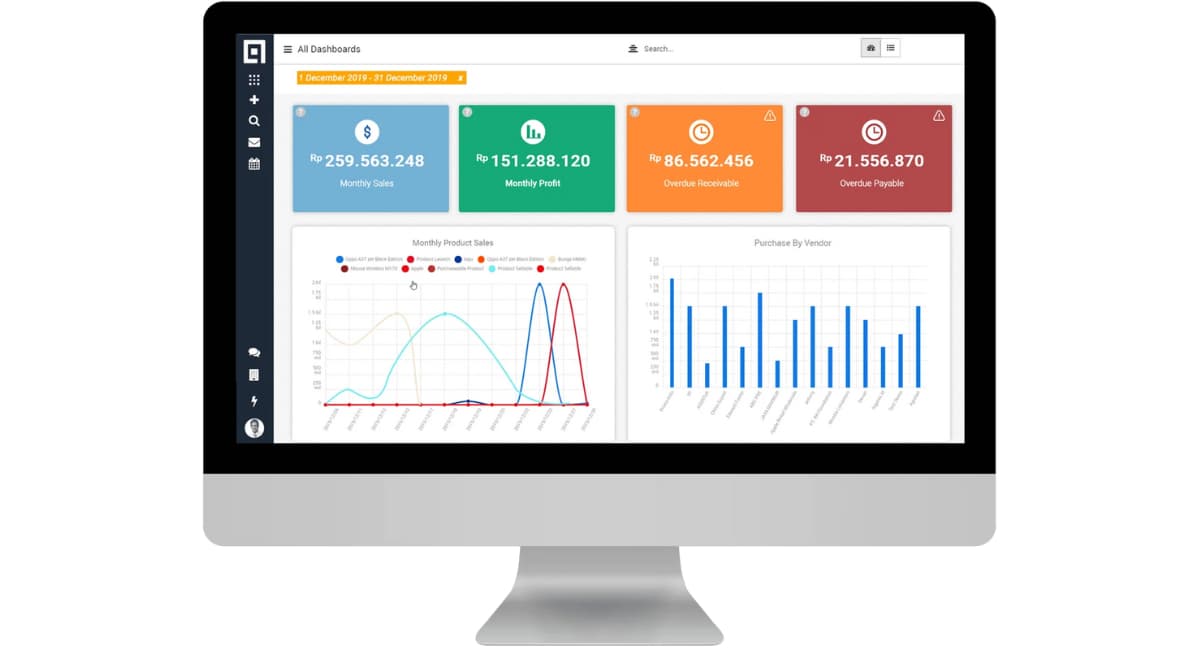In the intricate world of manufacturing and business operations, two pivotal systems stand at the forefront: Manufacturing Execution Systems (MES) and Enterprise Resource Planning (ERP). While both are instrumental in streamlining processes and enhancing efficiency, they serve distinct functions within an organization.
MES focuses on the shop floor, optimizing the nitty-gritty of production, whereas ERP casts a wider net, integrating various business functions into a cohesive whole. Understanding the differences and how they complement each other is crucial for any business looking to leverage technology for manufacturing success.
In this article, we will delve into the core functionalities and distinctions of MES and ERP systems, explore how they can be integrated for synergy, and provide insights into choosing the right system for your specific business needs.
Table of Content:
Table of Content
Key Takeaways
|
What Is Manufacturing Execution System (MES)?
A manufacturing execution system (MES) is a crucial technology for Singapore’s manufacturing sector. MES serves as a system that connects and monitors machines and work centers on the factory floor, ensuring smooth operations and improving production efficiency.
MES offers real-time data tracking and shop floor management capabilities, empowering manufacturers to monitor and optimize their processes for enhanced performance and profitability.
With MES, manufacturers can access real-time data on production processes, allowing them to make informed decisions promptly. This real-time data tracking enables efficient resource allocation, accurate production scheduling, and effective quality control. By leveraging MES, manufacturers in Singapore can streamline their shop floor management, identify and address bottlenecks, and achieve optimal production outcomes.
An MES system facilitates real-time communication between machines and work centers, ensuring seamless information flow and coordination. Crucial production data, including machine performance, product quality metrics, and inventory levels, are captured and updated in real-time. This enables manufacturers to track their production processes at every stage and make timely adjustments to optimize productivity and minimize downtime.
Moreover, an MES system allows for effective shop floor management by providing visibility into the entire manufacturing process. Manufacturers can view work orders, track and manage material usage, monitor employee performance, and track progress against production targets—all from a centralized platform.
This comprehensive shop floor management capability helps manufacturers ensure production efficiency, reduce waste, and deliver high-quality products to customers.
What Is Enterprise Resource Planning (ERP) System?
An enterprise resource planning (ERP) system is a strategic business process management tool that integrates all facets of an enterprise into one comprehensive information system.
ERP systems focus on resource planning, financial management, and operational oversight, providing a centralized platform for managing various aspects of a manufacturing business. These systems enable better decision-making and improved efficiency through streamlined processes and data accessibility.
Key Differences Between MES and ERP
MES and ERP systems play distinct roles in manufacturing operations, each focusing on different aspects to optimize efficiency and productivity. Understanding these key differences is essential for Singaporean manufacturers looking to enhance their organizational scope and improve manufacturing processes.
MES is a system that primarily centers around shop floor activities. It involves real-time data tracking, production scheduling, and quality control to provide detailed insights into the manufacturing process. MES enables manufacturers to optimize shop floor management, ensuring smooth operations and enhanced manufacturing efficiency.
On the other hand, ERP systems have a broader organizational scope. They encompass resource planning, financial management, and operational oversight. ERP systems handle data capture, analysis, and utilization for strategic decision-making. This comprehensive approach allows manufacturers to gain valuable insights, improve resource allocation, and drive overall operational excellence.
The integration of MES and ERP systems can lead to complementary benefits and enhanced manufacturing efficiency. By combining the detailed insights from MES with the strategic oversight of ERP, manufacturers can optimize shop floor activities, resource allocation, and decision-making processes. This integration allows for a holistic approach to manufacturing operations, resulting in improved efficiency, reduced costs, and increased competitiveness.
The Synergy Between MES and ERP
MES and ERP systems play critical roles in enhancing visibility, operational efficiency, and decision-making processes in the manufacturing industry. By integrating these two systems, manufacturers in Singapore can unlock a range of benefits that contribute to their overall success.
Integration enables manufacturers to achieve greater visibility into their operations, allowing for real-time monitoring and analysis. This enhanced visibility empowers decision-makers to make informed choices by providing them with accurate and up-to-date data.
One area where integration proves particularly valuable is inventory management. By combining MES and ERP systems, manufacturers can optimize inventory levels, reduce waste, and ensure seamless supply chain operations. These improvements ultimately lead to cost savings and a more efficient production process.
Additionally, integration between MES and ERP systems enables better production scheduling. Real-time data and insights provided by MES allow for more accurate planning, reducing downtime and maximizing productivity. Manufacturers can optimize production flows, minimize bottlenecks, and ensure smooth operations throughout the entire manufacturing process.
Quality control is another area that benefits from the synergy between MES and ERP. By integrating these systems, manufacturers can streamline quality control procedures, ensure adherence to standards, and quickly identify and address any quality issues that may arise. This ultimately leads to higher-quality products and increased customer satisfaction.
The integration of MES and ERP systems not only streamlines operations but also strengthens the decision-making processes. With real-time data at their disposal, manufacturers can make informed decisions regarding resource allocation, process optimization, and cost management. This enables them to adapt quickly to market changes and capitalize on emerging opportunities.
The synergy between MES and ERP contributes to overall operational excellence in the manufacturing sector. By leveraging the capabilities of both systems, manufacturers can enhance visibility, improve operational efficiency, and drive strategic decision-making. This integration is crucial for Singaporean manufacturers looking to stay competitive and achieve long-term success in the dynamic manufacturing landscape.
Choosing the Right System for Your Business
When it comes to selecting the right system for your manufacturing business, there are several crucial factors to consider. As a Singaporean manufacturer, evaluating your operational needs, scalability requirements, and technological readiness is essential. By carefully assessing these aspects, you can make an informed decision that aligns with your business goals and maximizes efficiency.
One important consideration is the size of your manufacturing operations. Are you a small-scale facility or a large industrial plant? The complexity of your processes also plays a significant role. Some businesses may have more straightforward manufacturing operations, while others deal with intricate production processes that demand specialized systems.
Additionally, you need to understand the specific industry requirements that apply to your business. Different manufacturing sectors may have unique needs, regulations, and compliance standards. Ensuring that any system you choose meets these requirements is crucial for smooth operations and maintaining compliance.
Another critical aspect to evaluate is the scalability of the system. Will it be able to grow with your business? You want a system that can accommodate future expansions and evolving needs, enabling seamless scalability as your manufacturing operations expand or diversify.
Technological readiness is another key consideration. Are you equipped with the necessary infrastructure and resources to implement and support the chosen system? It is vital to assess the compatibility of the system with your existing IT infrastructure, as well as the technical capabilities and expertise of your team.
Cost and complexity are also crucial factors. Determine the overall cost of implementing the system, including upfront investments, recurring expenses, and potential maintenance costs. Additionally, consider the complexity of integrating and using the system within your organization, as well as the impact it may have on your workforce and daily operations.
Fortunately, HashMicro provides a pricing scheme that you can download for free. So, if you’re interested in implementing HashMicro’s ERP system for your manufacture company, you can learn and see how much the cost you need to invest, just click on the banner down below.
Implementation Strategies for Singaporean Manufacturers
In some cases, a combination of MES and ERP systems may be the optimal solution for your business. By integrating these systems, you can leverage the unique benefits they offer and achieve a more comprehensive approach to managing your manufacturing operations.
However, implementing Manufacturing Execution Systems (MES) and Enterprise Resource Planning (ERP) in Singapore’s manufacturing landscape requires careful planning and consideration of regulatory compliance and market demands. Leveraging the best ERP software can significantly streamline this process by ensuring integration, scalability, and compliance with local standards. Here are several strategies that can be followed:
- Addressing regulatory compliance: Singaporean manufacturers need to understand and follow specific regulations and standards when implementing MES and ERP systems to ensure compliance.
- Analyzing market demands: Manufacturers should study market needs and trends to align their MES and ERP system strategies for better decision-making and optimized operations.
- Overcoming common challenges: Implementing MES and ERP systems involves challenges like integration, data transfer, and training. Manufacturers need to plan ahead to address these issues for a smooth system transition.
- Following best practices: Following best practices, like detailed testing, clear communication, stakeholder involvement, and process documentation, is vital for the successful implementation of MES and ERP systems to fully benefit manufacturers.
- Leveraging expertise: Collaborating with specialized consultants for MES and ERP implementation can greatly enhance project success through expert guidance and insights for optimal system setup and integration.
By following a systematic approach and considering local requirements, Singaporean manufacturers can effectively implement MES and ERP systems to streamline their manufacturing operations, improve efficiency, and stay ahead of the competition.
Future Trends in Manufacturing Systems
The manufacturing industry in Singapore is on the brink of a significant transformation, driven by the emergence of new technologies. The convergence of emerging technologies, such as the Internet of Things (IoT), artificial intelligence (AI), and cloud computing, is set to revolutionize the way businesses operate and impact the manufacturing sector in profound ways.
By leveraging these innovative technologies, Singaporean manufacturers can unlock new opportunities and address the complex challenges of the future. The Internet of Things (IoT) enables connectivity and real-time data exchange between machines. AI-powered systems can automate repetitive tasks, optimize processes, and enable proactive decision-making.
Furthermore, cloud computing offers scalable and cost-effective solutions for data storage, analysis, and collaboration. Manufacturers can leverage cloud-based platforms to securely store and access critical manufacturing data, facilitate remote monitoring and management, and enable seamless integration between different systems.
To prepare for the future, Singaporean manufacturers must embrace these emerging technologies and adapt their operations accordingly. By investing in digital solutions and fostering a culture of innovation, manufacturers can gain a competitive edge, enhance operational efficiency, and meet the changing demands of customers and markets.
It is crucial for businesses to actively explore and implement these technologies to position themselves as leaders in the evolving manufacturing landscape.
Why HashMicro’s ERP System is The Best Choice for Singapore’s Manufacturing Companies
In Singapore’s thriving manufacturing landscape, the choice between an ERP system and a MES is crucial. While both offer valuable solutions, HashMicro’s ERP system emerges as the superior choice for manufacturing companies seeking comprehensive, integrated, and future-proof solutions. Here’s why:
- End-to-end integration: Our system provides a comprehensive integration of all business areas, from procurement to finance, improving data flow, teamwork, and overall efficiency in manufacturing operations.
- Business intelligence and analytics: HashMicro’s ERP system offers advanced business intelligence and analytics, enabling manufacturers to gain insights, spot trends, and make informed decisions for process optimization and continuous improvement.
- Supply chain optimization: Our system optimizes the supply chain, from managing suppliers to planning distribution, reducing costs and lead times, and improving customer satisfaction with timely, quality product delivery.
- Financial management and compliance: HashMicro’s ERP system provides comprehensive financial management and compliance tools, ensuring regulatory adherence, financial transparency, and streamlined processes in manufacturing finance operations.
- Scalability and flexibility: Our system is designed for growth, providing the scalability and flexibility needed to expand operations, enter new markets, and add product lines smoothly, ensuring long-term value from your investment.
With all these features and plus points, our ERP empowers you to streamline operations, drive growth, and stay ahead of the competition in today’s rapidly evolving manufacturing landscape.
Also Read: Best ERP Software Recommendations – Explore the best software options available this year and find the right fit for your business needs.
Conclusion
While MES systems are adept at managing shop floor operations, HashMicro’s ERP system stands out by offering comprehensive integration across all business functions, ensuring seamless data flow and collaboration.
The strategic implementation of HashMicro’s ERP not only aligns with Singapore’s stringent regulatory framework and dynamic market demands but also scales with your company’s growth. By choosing HashMicro’s ERP, Singaporean companies can leverage robust analytics, optimize their supply chain, and maintain robust financial governance.
Experience the transformative power of HashMicro’s ERP system firsthand and see how it can propel your business forward. Don’t miss out on the opportunity to enhance your manufacturing operations—request a free demo today and witness the difference it can make.


























































